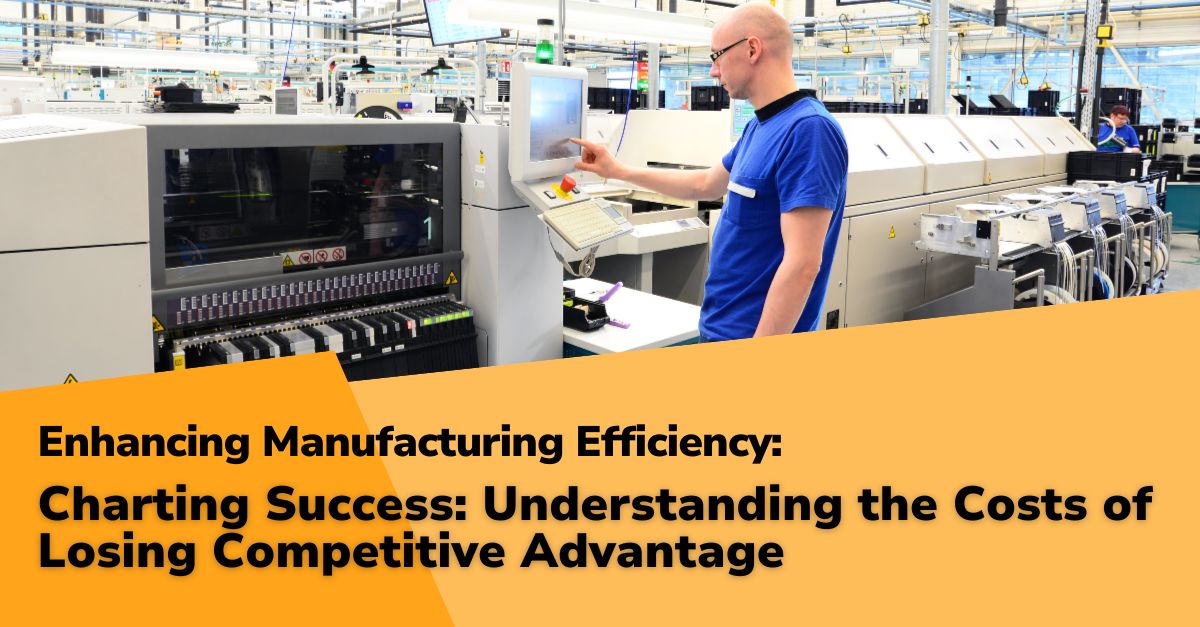
In the intricate landscape of large-scale manufacturing, where competitive advantage is continually contested, the role of a well-structured Management Operating System (MOS) becomes critically important.
A deficient MOS hinders operational efficiency and critically impairs a manufacturer’s ability to innovate, adapt, and excel in an increasingly competitive market.
In this final installment of the, ‘Enhancing Manufacturing Efficiency,’series, we explore the top ten ways an inadequate MOS can diminish a manufacturer’s competitive advantage, encompassing aspects such as slowed innovation cycles, operational inefficiencies, and the inability to respond effectively to market fluctuations.
Each point illustrates the cascading effects of a suboptimal MOS on competitive advantage, demonstrating how it can lead to a gradual yet significant decline in market positioning, customer retention, and overall business growth.
Emphasizing the need for a robust, nimble, and strategically aligned MOS, this analysis offers insights into the integral role of an effective MOS in sustaining and enhancing a manufacturer’s competitiveness in the global market.
1Diminished Market Share:
The absence of a competitive edge due to an ineffective MOS can lead to a significant decline in market share. Manufacturers struggle to keep up with changing market trends and customer preferences, gradually eroding their market presence.
2Eroded Brand Reputation:
The inability to maintain a competitive edge can harm a manufacturer’s brand reputation. A stagnant approach to innovation and adaptation can tarnish the brand image, making it less appealing to consumers and business partners.
3Weaker Market Position:
An inefficient MOS hinders a manufacturer’s ability to maintain a strong market position. Competitors more adept at responding to market dynamics can quickly outpace those with less responsive systems.
4Diminished Customer Attraction and Retention
Failing to adapt rapidly to customer needs and market changes leads to decreased customer attraction and retention. Manufacturers risk losing their customer base to more agile and customer-centric competitors.
5Loss of Strategic Partnerships:
A decline in competitive edge can result in losing critical strategic partnerships. Suppliers and collaborators may prefer to align with more innovative and market-leading companies.
6Reduced Pricing Power:
A lack of market competitiveness often leads to diminished pricing power. Products or services become less differentiated, reducing the ability to command premium prices.
7Hindered Access to New Markets:
An ineffective MOS can impede a manufacturer’s ability to enter and compete in new markets, limiting potential growth opportunities.
8Decreased Investor Confidence:
Investors favor companies that demonstrate market leadership. A loss of competitive edge can reduce investor confidence, affecting funding opportunities and expansion plans.
9Talent Attraction and Retention Challenges:
Top talent is drawn to industry leaders. Companies that lose their competitive edge face challenges in attracting and retaining skilled professionals.
10Increased Operational Costs:
Failing to maintain a competitive edge can lead to higher operational costs. Inefficiencies and an inability to leverage economies of scale contribute to increased expenditures.
Conclusions for Manufacturing Operations Leaders
As we explore the significant impact of an ineffective Management Operating System (MOS) on maintaining a competitive edge in manufacturing, it’s clear that the strategic operation of an organization is as crucial as its technical aspects.
The consequences of a deficient MOS extend beyond basic operational functionality, critically affecting a manufacturer’s position in the competitive market landscape.
For manufacturing leaders, the path forward involves recognizing the comprehensive impact of an underutilized MOS and actively developing strategies to strengthen it.
By doing so, they can foster an environment where operations are efficient and strategically aligned to maintain a competitive advantage, leading to improved market positioning, innovation, and business growth.
Maximize Competitive Edge with POWERS
At POWERS, we skillfully address the challenges of developing robust systems, processes, and behaviors in today’s dynamic manufacturing environments.
Our approach, built on extensive real-world experience, focuses on enhancing Management Operating Systems with solutions that effectively bolster a manufacturer’s competitive edge.
- Customized Strategic Solutions: Our strategies cater to each manufacturing operation’s unique challenges and opportunities, ensuring MOS implementations that drive competitive success.
- Data-Informed Market Positioning: Utilizing the latest data analytics, POWERS transforms complex data sets into strategic insights, guiding manufacturers to a stronger market position.
- Innovative Approach for Market Leadership: We go beyond traditional MOS frameworks, integrating innovative strategies for market leadership, emphasizing agility, strategic foresight, and operational excellence.
- Fostering a Culture of Continuous Strategic Evolution: Our methodology cultivates a culture where continuous improvement is aligned with strategic market goals, ensuring manufacturers are always ahead of the curve.
- Sustainable Competitive Advantage: We focus on building long-term strategies that optimize current operations and lay the foundation for enduring market dominance.
With POWERS, manufacturers can confidently navigate the complexities of the modern market, ensuring their operations are efficient and strategically poised for ongoing success and market leadership.
Begin your journey toward enhanced competitive edge and strategic market positioning with POWERS. Contact our experts at +1 678-971-4711 or via email at info@thepowerscompany.com for tailored solutions that drive your manufacturing operations forward.
Continue Reading from this Mastery Series
- Part 1 - Identifying Key Inefficiencies in the Absence of a Management Operating System
- Part 2 - Top 10 Pitfalls: Lack of an MOS Derails Productivity
- Part 3 - Top 10 Quality Issues at Risk Without a Robust Management Operating System
- Part 4 - The High Cost of an Ineffective Management Operating System
- Part 5 - Without an Optimized Management Operating System, Decision-Making is Severely Impaired
- Part 6 - Scaling Challenges of an Inadequate Management Operating System
- Part 7 - The High Price of Low Engagement: Unpacking the Operational Impact of Employee Discontent
- Part 8 - Safeguarding Success: Decoding the Impact of Compliance and Safety Issues
- Part 9 - Examining the Cost of a Slow Response to Market Shifts
- Part 10 - Charting Success: Understanding the Costs of Losing Competitive Advantage







